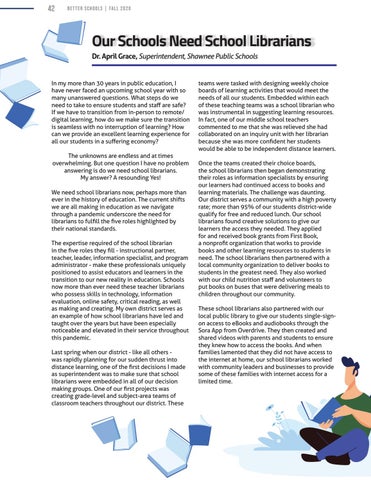42
b e t t e r sc h o o l s | fa l l 2 0 2 0
Our Schools Need School Librarians Dr. April Grace, Superintendent, Shawnee Public Schools
In my more than 30 years in public education, I have never faced an upcoming school year with so many unanswered questions. What steps do we need to take to ensure students and staff are safe? If we have to transition from in-person to remote/ digital learning, how do we make sure the transition is seamless with no interruption of learning? How can we provide an excellent learning experience for all our students in a suffering economy? The unknowns are endless and at times overwhelming. But one question I have no problem answering is do we need school librarians. My answer? A resounding Yes! We need school librarians now, perhaps more than ever in the history of education. The current shifts we are all making in education as we navigate through a pandemic underscore the need for librarians to fulfill the five roles highlighted by their national standards. The expertise required of the school librarian in the five roles they fill - instructional partner, teacher, leader, information specialist, and program administrator - make these professionals uniquely positioned to assist educators and learners in the transition to our new reality in education. Schools now more than ever need these teacher librarians who possess skills in technology, information evaluation, online safety, critical reading, as well as making and creating. My own district serves as an example of how school librarians have led and taught over the years but have been especially noticeable and elevated in their service throughout this pandemic. Last spring when our district - like all others was rapidly planning for our sudden thrust into distance learning, one of the first decisions I made as superintendent was to make sure that school librarians were embedded in all of our decision making groups. One of our first projects was creating grade-level and subject-area teams of classroom teachers throughout our district. These
teams were tasked with designing weekly choice boards of learning activities that would meet the needs of all our students. Embedded within each of these teaching teams was a school librarian who was instrumental in suggesting learning resources. In fact, one of our middle school teachers commented to me that she was relieved she had collaborated on an inquiry unit with her librarian because she was more confident her students would be able to be independent distance learners. Once the teams created their choice boards, the school librarians then began demonstrating their roles as information specialists by ensuring our learners had continued access to books and learning materials. The challenge was daunting. Our district serves a community with a high poverty rate; more than 95% of our students district-wide qualify for free and reduced lunch. Our school librarians found creative solutions to give our learners the access they needed. They applied for and received book grants from First Book, a nonprofit organization that works to provide books and other learning resources to students in need. The school librarians then partnered with a local community organization to deliver books to students in the greatest need. They also worked with our child nutrition staff and volunteers to put books on buses that were delivering meals to children throughout our community. These school librarians also partnered with our local public library to give our students single-signon access to eBooks and audiobooks through the Sora App from Overdrive. They then created and shared videos with parents and students to ensure they knew how to access the books. And when families lamented that they did not have access to the internet at home, our school librarians worked with community leaders and businesses to provide some of these families with internet access for a limited time.
